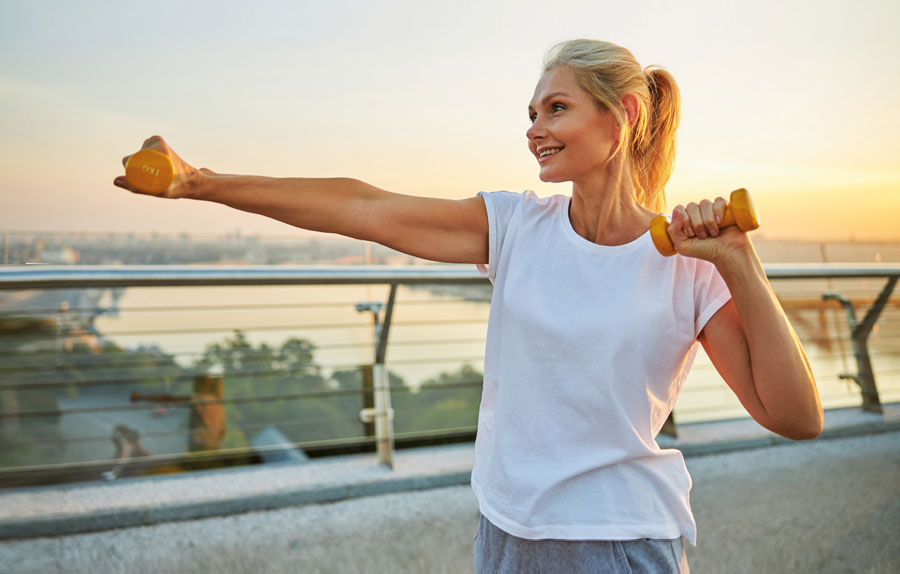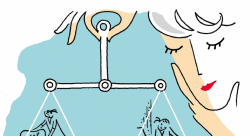
Promises to make major changes to your lifestyle usually get broken, but there are many small things you can do that are more likely to succeed, says Kerry Parnell
It’s that time of year again, when we all pledge to get fit and quit our bad habits. But how do you keep your resolve into February and beyond? The key is to set small, achievable targets you can stick to, seems to be the consensus.‘A more efficient way to form a long-lasting habit is to develop micro-habits,’ says Jasmine Eskenzi, CEO of wellbeing app The Zensory. ‘Take a minute out of your day to practice mindfulness exercises, or take a 10-minute walk at lunchtime,’ she says. These small victories can lead to bigger changes.
Another tip is to try ‘habit-stacking’ - adding a good habit to something you already do. ‘Brush your teeth while doing squats,’ says Dr Mayoni Gooneratne of the website Human Health, ‘or try some lunges while the kettle boils.’ We have assembled a range of healthcare and wellbeing experts who agreed to share their advice on how to make small changes that will give big and longlasting results.
1. Meet new people
Feeling isolated and lonely can have a negative effect on your mental and physical health, so one of the best things you can do in 2024 is make an effort to meet new people, says counsellor Georgina Sturmer (georginasturmer.co.uk). ‘Challenge yourself to take up an activity that will help you meet new people,’ she says. ‘When we build relationships, it opens us up to new experiences and perspectives and makes us feel more connected, which can reduce stress, depression and anxiety.’
2. Go outside first thing in the morning
We all know fresh air is good for us, but a blast of sunlight first thing in the morning will regulate your circadian rhythms and improve your energy and sleep, says online Pilates instructor Lottie Anderson from Bondi Rise (bondirise.com). ‘My easy-to-keep resolution is to get outside and move your body first thing in the morning, even if it’s just for five minutes.’
3. Take a walk
While you are outside you may as well go for a quick walk. Even a ten-minute stroll will release endorphins in your body and make you feel more positive.
And if you pick up your pace, you will see even bigger results. ‘Engaging in moderate-intensity exercise for as little as ten minutes a day can lower the risk of heart disease and boost your metabolism,’ says Jamie Winn, of the Universal Drugstore pharmacy ( universaldrugstore.com).
4. Get stronger
Fitness is not all about burning calories - one of the most essential changes we can make as we get older is to begin strength training. This will combat loss of muscle mass, which naturally decreases with age. Start with exercises such as squats and arm lifts, two to three times a week. Personal trainer Nicky McBurney says even 20 minutes of exercise will get results. ‘Start with just a simple body-weight workout and build up to incorporating small weights,’ she says. You can begin from home by joining in with online workouts or join a class at a gym.
5. Boost your fibre
Committing to eating at least 30g of fibre a day will help your gut health and protect against stroke and heart disease, says therapist Anna Mapson, of Goodness Me Nutrition (goodnessme-nutrition.com). ‘Add more fruit and vegetables to your plate at every meal. Wholegrains like rice, oats and wheat are a brilliant source of fibre, as well as pulses like lentils, nuts and seeds,’ she says. ‘For every 7g of fibre you eat per day you can reduce your chance of a heart attack or stroke by about 9% - those are good odds!’
6. Prioritise your sleep
If you achieve nothing else, sorting out your sleep in 2024 will have a major impact on your general health and wellbeing, says the TV journalist and former doctor Michael Mosley. ‘My resolution for 2024 will be to prioritise sleep. The start of the year, when we are feeling refreshed after our Christmas break, is a great time to get your sleep hygiene and habits back on track,’ he says. ‘Sleep deprivation can cause a host of problems with your hormones, and this in turn can affect your energy, mood, weight, appetite and sleep on subsequent nights.’
7. Drink more water
We all know we should drink plenty of water, but making sure this happens can be one of the most beneficial changes we can make, says Abbas Kanani, a pharmacist at Chemist Click (chemistclick.co.uk).
‘It helps to flush bacteria from your bladder, aid digestion, prevent constipation and normalise blood pressure. Most people should aim to drink around six to eight glasses of fluid a day, according to the NHS,’ he says. ‘A good way to start is to alternate other drinks with water, try sparkling water, no-sugar squash or adding a slice of lemon or lime.’
 8. Puzzle over it
8. Puzzle over itIt has been proven that doing puzzles helps with memory and keeps your mind sharp, so this resolution is one of the most enjoyable to keep. Adding in puzzle time to your daily schedule can anchor your thoughts to the present moment and give your mind a rest, says Dr Zoe Williams, who is part of the Ravensburger Positively Puzzling campaign. ‘Having a puzzle on the go, such as a jigsaw, and spending just a few minutes a day adding pieces can provide a sense of peace, as well as improving your concentration, memory and problem-solving skills,’ she says.
9. Take vitamin D for healthy hair
One of the best things we can do for healthier hair is make sure we get enough vitamin D, says Anabel Kingsley, consultant trichologist at Philip Kingsley Hair Clinics (philipkingsley.co.uk). It is usually produced in the skin by exposure to sunlight but can become depleted in the winter months. She explains that it is instrumental in maintaining a healthy anagen-to-telogen (growth-toshedding) ratio of hairs on your scalp. ‘Low vitamin D can shorten the anagen phase,’ she says. ‘Vitamin D deficiency is common in both men and women.
Take a daily supplement, especially in winter.’
10. Recruit an exercise buddy
If you want to stick to a new fitness resolution, teaming up with somone who shares the same goal will help motivate both of you to stay on track. Whether you go to an exercise class or just walk together, you are far less likely to give up. ‘A support system, such as a workout buddy or a friend with similar health ambitions, will help keep you accountable,’ says Glenn Cross, the chairman of EZZ Life Science (ezzlife.com.au).
‘By prioritising your routines and integrating them into your daily lives, you’re both more likely to stick to your schedules in the long run.’







